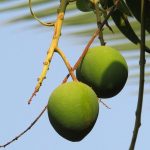African mango, scientifically known as Irvingia gabonensis, is an intriguing tropical fruit that has gained significant attention for its remarkable health-enhancing properties. Native to the rainforests of West and Central Africa, this vibrant fruit has long been a staple in traditional medicine practices, and its popularity continues to soar as research unveils its vielfältigen Vorteile.
The African mango tree produces large, football-shaped fruits with a sweet and tart flavor. The pulp of the fruit is rich in essential nutrients, including vitamins, minerals, and antioxidants. Its seeds, known as dika nuts, have also been found to possess medicinal properties.
**Weight Loss and Metabolism Boost**
One of the most well-known benefits of African mango is its ability to promote weight loss. Studies have shown that consuming the fruit or its extract can help reduce body weight, body mass index (BMI), and waist circumference. The fruit is believed to suppress appetite, reduce fat absorption, and boost metabolism.
**Cholesterol and Blood Sugar Control**
African mango has also been found to have positive effects on cholesterol levels and blood sugar control. The fruit contains a unique fiber called Irvingia fiber, which has been shown to lower LDL (bad) cholesterol and raise HDL (good) cholesterol. Additionally, African mango has been found to improve insulin sensitivity, which can help regulate blood sugar levels and reduce the risk of type 2 diabetes.
**Antioxidant Activity**
African mango is a rich source of antioxidants, which help protect the body against damage caused by free radicals. Free radicals are unstable molecules that can contribute to aging, chronic diseases, and cancer. The antioxidants in African mango help neutralize these harmful molecules and protect cells from damage.
**Anti-inflammatory Properties**
Some studies have suggested that African mango обладает противовоспалительными свойствами. Inflammation is a natural response to injury or infection, but chronic inflammation can contribute to a variety of health conditions. The anti-inflammatory properties of African mango may help reduce inflammation and improve overall health.
**Other Potential Benefits**
In addition to the aforementioned benefits, African mango has also been linked to several other potential health benefits, including:
* Improved gut health
* Reduced risk of heart disease
* Enhanced cognitive function
* Anti-aging effects
**Safety and Side Effects**
African mango is generally considered safe for most people to consume. However, it is important to note that the fruit and its extract may interact with certain medications, such as blood thinners and diabetes medications. It is always advisable to consult with a healthcare professional before taking African mango supplements.
**Conclusion**
African mango is a remarkable superfruit with a wide range of health-promoting properties. From weight loss to cholesterol control, to anti-inflammatory and antioxidant benefits, this vibrant fruit has much to offer. While more research is needed to fully understand the full extent of its benefits, the current evidence suggests that African mango is a valuable addition to a healthy diet.

